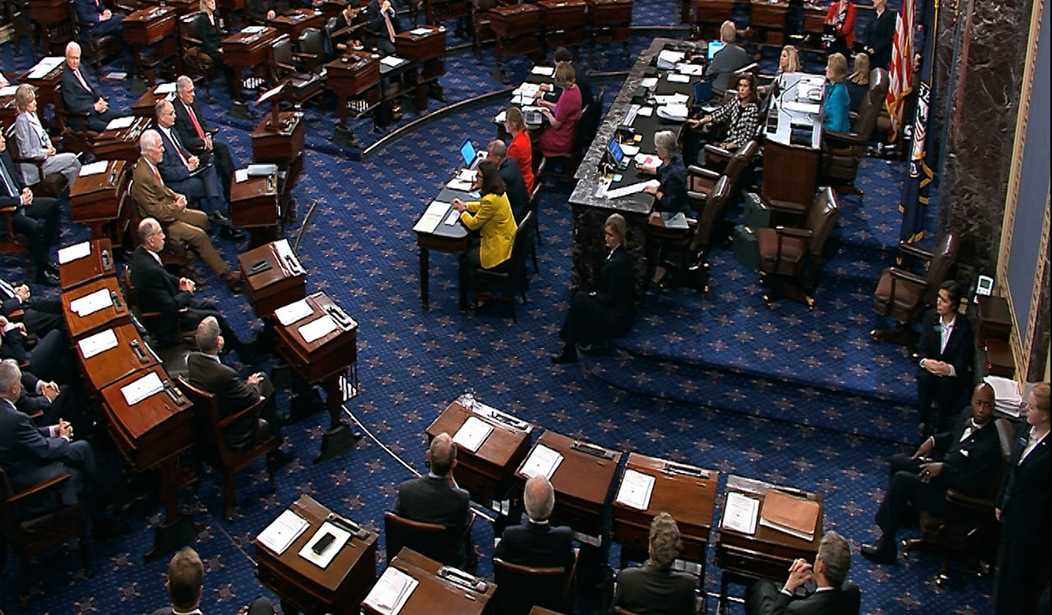The race for control of the U.S. Senate is heading toward the home stretch and after almost all the primaries have been held, both Republicans and Democrats have a case to be made that they have a good shot at ending up with a majority of the upper chamber.
Reading the tea leaves this election is especially difficult. Sabato’s Crystal Ball rates the battle for Senate control a tossup. Others think the Republicans have a one or two-seat edge.
Even in a “red wave” election, winning the Senate is going to be an uphill battle for Republicans. Of the 35 seats up for grabs, Republicans are defending 21 of them while Democrats are defending only 14 seats, all of which are in states that voted for President Joe Biden in 2020. This limits Republicans’ offensive opportunities.
But there are several incumbents seen as vulnerable for a variety of reasons. Raphael Warnock won his special election in what most observers still see as a red state — Georgia. Mark Kelly is also running for re-election in a very red state — Arizona. A loss in either or both of those states would give the GOP control.
And in Nevada, Catherine Cortez Masto will have a real battle on her hands to fend off the strong challenge of former state AG Adam Laxalt.
Related: Georgia Republicans Have a Stronger Ground Game in 2022
On the Republican side, Wisconsin’s Ron Johnson is in a very competitive race with Lt. Gov. Mandela Barnes. And in Pennsylvania, Democratic Lt. Gov. John Fetterman is giving newcomer Mehmet Oz all he can handle.
The GOP can afford to lose one of those two vulnerable seats. Otherwise, knocking off Democrats in states won by Joe Biden is going to be tough. Can Republicans do it while running so many candidates with so little experience?
That this slate of Republican candidates is so light on past officeholding experience is at least, to some extent, a question of voter choice. But it is also about candidate choices — namely, the decision whether to run in the first place. Potentially strong GOP challengers such as Govs. Doug Ducey (R-AZ), Larry Hogan (R-MD), and Chris Sununu (R-NH) all opted against running; so too did several Republican House members and/or statewide elected Republicans in states like Ohio and Pennsylvania. And it is about Trump’s choices, too: Had he not pushed for Walker to run in Georgia, it seems like that primary would have been more crowded and would have included some more traditional candidates. Trump also torpedoed the candidacy of state Attorney General Mark Brnovich in Arizona, who finished third in Tuesday’s primary behind candidates without past officeholding experience.
Trump would point out that he won the presidency in 2016 with no political experience at all. Besides, there’s an upside to not having any experience: no record for an opponent to attack you for.
One of the messages we will hear over and over again from Republicans this cycle is a nationalizing one made possible by experience in federal office, which goes something like this: “[Democrat X] votes [some very high percentage] of the time with Joe Biden.” Obviously, all of the Democratic senators in competitively-rated races have a voting record, as they are all current Senate incumbents (Mark Kelly of Arizona, Michael Bennet of Colorado, Raphael Warnock of Georgia, Catherine Cortez Masto of Nevada, Maggie Hassan of New Hampshire, and Patty Murray of Washington). So too do a couple of other Democrats running in races we rate as being at least somewhat competitive: U.S. Reps. Val Demings of Florida and Tim Ryan of Ohio. Based on FiveThirtyEight’s tally of how often members of Congress vote with or against President Biden — a source that Republicans have cited and will cite in their ads — here are how the 6 Democratic incumbents and 2 challengers from the House score: 94% (Arizona’s Kelly), 98% (Colorado’s Bennet), 100% (Florida’s Demings), 96% (Georgia’s Warnock), 92% (Nevada’s Cortez Masto), 96% (New Hampshire’s Hassan), 100% (Ohio’s Ryan), and 96% (Washington’s Murray).
In a day and age where both Senate and House members are guided, directed, and ordered around by more knowledgable staff, experience isn’t all it’s cut out to be.
Another advantage of having no record to run on is that the national media is forced to become gossip mongers. Does anyone really care if Herschel Walker fudged a little on his resume? It’s amazing what national reporters believe voters think is important.
Republicans are favored to take the Senate, but the margin has dropped in recent weeks. This was to be expected, given the sky-high expectations generated by Republican fundraisers and consultants. The fact is, this is still close to being a 50-50 country and the Senate will probably reflect that.










Join the conversation as a VIP Member